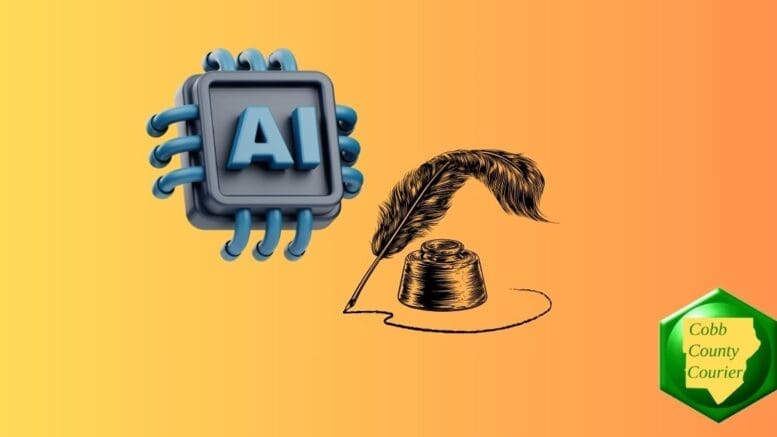By John A. Tures, Professor of Political Science, LaGrange College
[This is the second of two columns. Follow this link to read Part 1]
A writer on Medium.com contends that A.I. is a long time away from reaching human intelligence. The best it can do today is to be a copycat, like a Google Search guessing what you want something. And even if it equals us, “Our future human-like intelligent AI will be just another intelligent but emotionless writer in the market, lacking the soul, the creative brilliance, and the profound insights that come from genuine human experience,” he adds.
Mike Pearl notes “AI writers have proven to be error machines that create unreliable junk.” He writes of Stephen Marche who was able to write an A.I. novel, titled Death of an Author. But there’s a catch. “He may have created the first decent book that anyone can reasonably call “AI-generated,” but it required him to painstakingly force the AI applications to write the book he wanted — sometimes sentence-by-sentence.” That can take as much time, if not more, than writing it yourself. You could teach a cat to eventually play checkers, and that would be a feat, but it’s unlikely to be more efficient and effective than if you played the game yourself.
And A.I. may not want to follow your instructions “sentence-by-sentence.” There’s the legendary story of a filmmaker who tried to have an A.I. program write his screenplay about a politician who uses A.I. to make his decisions for him. As Futurism reveals there were hallucinations, missed deadlines, and excuses. In writing another scene, he found its work to be worse than what a kindergartner might produce.
So when Tiffany Yates Martin claims there may be a future requiring fewer creative people, the need to pivot, and even to reassess whether to write at all, human capitulation may be premature.
Actually, Tiffany Yates Martin’s advice on pivoting is not a bad idea, for any economy. “That means it’s more important than ever to understand on a core level what we value in life…I have pivoted my career any number of times. When I realized acting wasn’t going to be a viable way to make a living (and that nor did I want to wait tables forever), I learned copyediting. When that went electronic I jumped on the bandwagon. As soon as I saw the burgeoning self-publishing movement I realized how important developmental editors would be, and I pivoted my business again. When the pandemic came I immediately pivoted to include more online presenting and teaching. We do what we have to do to survive. So far I’ve been lucky to continue to make a living in my creative field, but I always know that could change.” A little competition, and reinvention, may not be bad things.
There is a lesson for all of us. Don’t write boring, poor-quality work void of human creativity and with no attempt at a connection, or you will be replaced. In an article for The Teaching Professor, I have my students write a paper draft summary with A.I., which is like creating a tackling dummy or a paper to challenge them, like programming ghosts in Pac-Man to chase or run away from the protagonist.
After they are done, I tell them to focus on the positives; it’s produced quicker with fewer errors. Then they have to go over the negative elements, which is when they reveal that they find it soulless, lacking context or connection, uninteresting. “Your competition may use this program when competing with you,” I challenge them. “How are you going to beat it?” That’s the secret to success in this modern showdown of human versus artificial intelligence.
John A. Tures is a professor of political science at LaGrange College in LaGrange, Georgia. His views are his own. He can be reached at jtures@lagrange.edu. His “X” account is JohnTures2.
